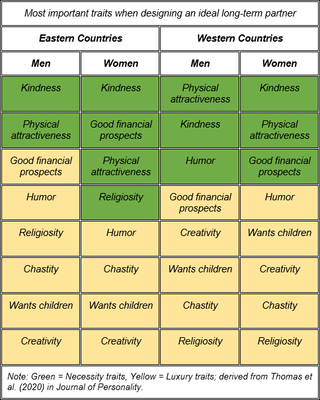Mating
The Most Valuable Trait in Any Relationship Partner
What people prioritize when imagining a perfect partner.
Posted January 27, 2022 Reviewed by Lybi Ma
Key points
- People want partners with desirable traits but some are more important than others.
- The traits most important are fundamental for reproductive success.
- People try to enhance some of these traits, like physical attractiveness and financial prospects.
- In contrast, kindness is often neglected but might be a good avenue for self-development.
Is having an attractive partner important? What about an intelligent one? Should they have money and resources? What about being good with kids or being creative?
One of the difficult things about researching mating preferences is that most people think everything is desirable. Present a participant with a number of traits and ask them to rate their importance in a potential mate and they will tend towards the top end of whatever scale you're using.
How are we to sort the wheat from the chaff? Today on Darwin Does Dating, we reveal how we tell what traits are the most important in a mate and discuss the implications for those wanting to be competitive in the long-term mating market.
Signal among the noise
First, let’s clear up a misconception. Mate preferences vary, but they are not as random as some people believe. Differences exist between people, but their arrows tend to point in similar directions. Ask enough people from a group and you can start to get a feel for what “typical” preferences look like despite relative differences between its members.
If mate preferences were truly random, then this would be impossible to do. Luckily, they aren’t: You can detect the signal among the noise.
One of the ways our mate preferences are non-random is that people tend to want partners who possess high levels of all sorts of desirable qualities. This is problematic for people who want to understand what traits are more important than others. People like those looking to enhance themselves to attract a mate.
Wheat from the chaff
Luckily, there are ways to discover which traits are the most important. These normally involve asking participants to make some form of “forced choice” between different characteristics. For example, in our recent study, we used a task that will be very familiar to those who play video games with character creation.
We presented nearly 2,500 participants with eight traits and gave them a budget to “build” their ideal long-term partner. They did this a few times with different budgets.
By comparing how people allocated a small budget to when it was large, we revealed the traits participants rushed to spend their budget on (i.e., “necessities”) and those they left until they had a surplus (i.e., “luxuries”).
To make things even more interesting, we considered if these patterns differed by sex and whether the participant came from an Eastern or Western country.
Necessities and luxuries
The result of the exercise was that three traits emerged as general necessities: kindness, physical attractiveness, and good financial prospects. There was variation. Men tended to view a woman’s financial prospects as a luxury, while only Eastern women saw religiosity as a necessity.
From an evolutionary perspective, it’s no surprise that the “big three” represent traits historically fundamental for reproductive success. Kind, attractive partners with access to resources were those willing and able to invest time, resources and, in the case of offspring, good genes into a relationship.
In contrast, imagine yourself in a committed long-term relationship with someone selfish and uncooperative, with no status or resources, and who is far from soft on the eyes. Many do not have to imagine this - these reasons mirror some of the most common complaints stemming from unhappy marriages.

Kindness is king
For me, one of the most interesting things about the “big three” is that their importance is clear by the lengths people go to in enhancing (most of) them.
Some men and women work themselves into an early grave to accumulate wealth and status while others embark on unhealthy fad diets and intense workout regimes to enhance their appearance. These tendencies are not uniquely Western but appear exacerbated by industrialization and technological advances.
But what of kindness? Considering this was the top trait for most participants, it is interesting that there is no “booming” kindness industry offering courses to improve one’s empathy and compassion. Guides on sharing and caring are restricted to children’s programming, lessons taught by puppets rather than social media influencers.
Part of the issue, perhaps, is that kindness is hard to develop and its display is linked to relationship dynamics. For some, focusing on the development of co-operation, communication, and empathy-building happens only in couples counselling – something often sought as a “last resort” by couples in conflict.
The bottom line
People are picky about their partners and want them to possess desirable traits, but when the chips are down the most important traits seem to be those that, evolutionarily speaking, are fundamental for reproductive success. While people seem to naturally “build” or develop some of these (such as physical attractiveness and good financial prospects) others, like kindness, are seemingly neglected.
Those who want to make themselves more competitive in the long-term mating market, and those who want to continue to appeal to their current partner, might benefit from developing and displaying their kindness through cooperation, consideration, and empathy.
Facebook image: Shunevych Serhii/Shutterstock
References
Thomas, A. G., Jonason, P. K., Blackburn, J. D., Kennair, L. E. O., Lowe, R., Malouff, J., ... & Li, N. P. (2020). Mate preference priorities in the East and West: A cross‐cultural test of the mate preference priority model. Journal of personality, 88(3), 606-620.




